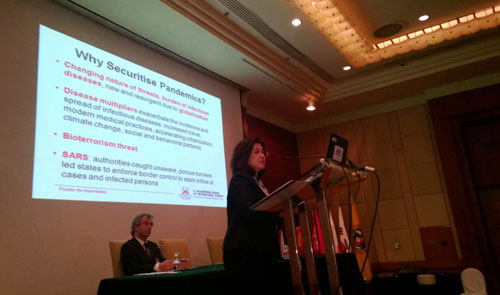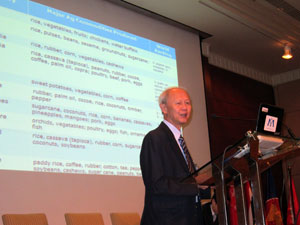High-Level Cross-Sectoral Consultation on Pandemics as Threats to Regional and National Security: Advancing the ASEAN 'Regional Multisectoral Pandemic Preparedness Strategic Framework'
Date: 9–11 January 2013
Venue: Manila, Philippines
Organised by: United States Department of Health and Human Services (USDHHS) and USAID

Head of Centre, Prof. Mely Caballero-Anthony, delivers her presentation on ‘ASEAN and the Threat of Pandemics’
A severe pandemic is one of the key threats to the functioning of a globalised complex system increasingly vulnerable to large-scale disasters that can disrupt the critical infrastructure and services essential to the functioning of society. The High-Level Cross-Sectoral Consultation on ‘Pandemics as Threats to Regional and National Security’ held in Manila from 9–11 January 2013 supports the continued international agenda for a coordinated, multisectoral preparedness and response plan to pandemics.
This three-day meeting was hosted by the Philippine Department of Health and Office of Civil Defense under the auspices of the National Disaster Risk Reduction and Management Council. Co-funded by the United States Agency for International Development (USAID) and the United States Department of Health and Human Services (USDHHS), the event was jointly organised by the USDHHS and the USAID-funded International Medical Corps’ PREPARE Project, in close cooperation with the ASEAN Secretariat, and with the epistemic support and participation of the RSIS Centre for NTS Studies.
 |
|
Senior Advisor on Food Security, Prof. Paul Teng, delivers his presentation on food and health.
|
|
ASEAN recently developed a regional pandemic preparedness and response framework for a coordinated, multisectoral system to mitigate the impact of severe pandemics and other major disasters that have the potential to disrupt the integrity and functionality of essential services and critical infrastructure throughout the region. The consultation provided the opportunity for an evidence-based analytic exchange of views involving multiple sectors and international stakeholders within the perspective of severe pandemics as fundamental threats to national, regional and global security. The meeting also provided a comparative platform for the presentation of the regional pandemic preparedness frameworks from two other important regions of the world: North America (US, Canada and Mexico); and the EU. The event encouraged valuable expert discussion and input for the development of the ASEAN regional framework on pandemic preparedness and response.
The consultation reached a consensus on the threats of pandemics to the functional socioeconomic and political security of ASEAN. The draft paper ‘Regional Framework in Responding to the Impacts of Pandemics’ was updated to reflect a multisectoral approach that includes the three pillars of the ASEAN Community – political security, economic, and socio-cultural which includes health and disaster preparedness. The meeting also arrived at specific recommendations on the protection of non-health critical infrastructure and continuity of essential operations and services essential to the regional public health preparedness and response framework. Recommendations were also given to empower and enable community resilience to mitigate the multisectoral impacts of pandemics among ASEAN member states. The concept note for an Interim Arrangement to Establish a Desk developed by the Philippine National Disaster Risk Reduction and Management Council as the implementing structure for the Regional Framework for pandemic preparedness and response was also discussed in detail for further development and ASEAN’s endorsement. The consolidated inputs and recommendations from the consultation will be put forth for the ASEAN Secretariat’s consideration for further development of the Regional Framework and for endorsement across the three pillars of the ASEAN Community.
Participants represented a broad range of stakeholders including senior interlocutors from all three ASEAN pillars; a similar, multi-pillar government representation from the 10 ASEAN member states; the ‘Plus Three’ dialogue partners (China, Japan, Korea); as well as a wide range of representatives from various UN agencies; international financing and donor organisations; regional and bilateral development organisations; academic and research institutions; humanitarian and non-governmental organisations; professional associations; as well as representatives from the private sector.
Posted on: 9/1/2013 9:00:00 AM |
Topic: Health Security


